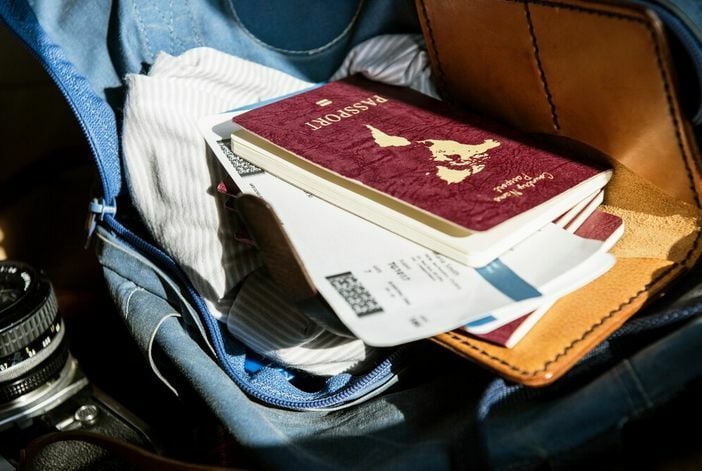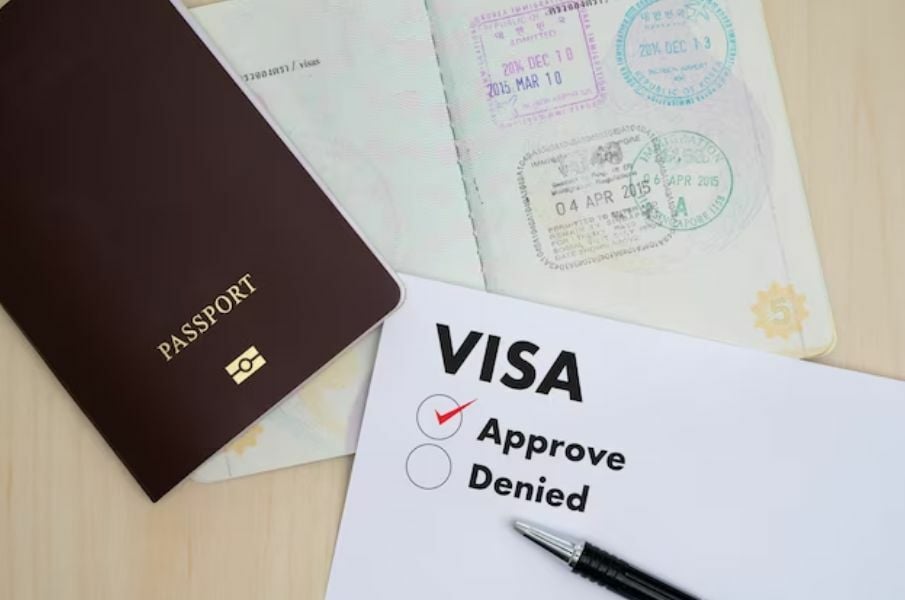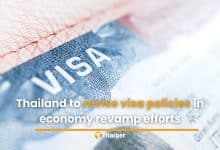Thailand visa types and requirements guide

If you’re planning to travel to Thailand for any reason, whether for tourism, business, or visiting friends and family, you must obtain a Thai visa. A visa is a legal document that allows you to enter and stay in Thailand for a specific period.
The Thai government offers several types of visas to foreign nationals, depending on the purpose of their visit and the length of stay they require. Each visa has its own set of requirements, fees, and processing time. Understanding the various types of Thai visas and their requirements is important before applying for one.
Visa types in Thailand you need to know about
| Visa Type | Purpose of Stay | Duration |
|---|---|---|
| Tourist Visa (TR) | Tourism | 60 days |
| Non-Immigrant Visa (B) | Business, Work, or Investment | 90 days |
| Non-Immigrant Visa (ED) | Education | 90 days to 1 year |
| Non-Immigrant Visa (O) | Family, Retirement, Volunteer | 90 days |
| Non-Immigrant Visa (O-A) | Retirement | 1 year |
| Thai Permanent Residency | Residency | Indefinite |
| Long-Term Resident Visa (LTR) | Residency | 10 years |
| Marriage Visa | Marriage | 1 year |
| Elite Visa | Long-term stay | Various options |
| Destination Thailand Visa | Tourism, Leisure, Medical | 180 days with 180 days extension |
1. Tourist Visa

The Tourist Visa (TR) is a popular type of Thai visa for those who plan to visit Thailand for the purpose of tourism, sightseeing, or visiting friends and relatives. It allows a stay of up to 60 days and can be extended for an additional 30 days at a Thai Immigration Office. The Tourist Visa (TR) for Thailand can be either a single-entry or multiple-entry visa.
Single-Entry Tourist Visa: As the name suggests, a single-entry Tourist Visa allows the holder to enter Thailand once and stay for up to 60 days. Once the holder exits Thailand, the visa becomes invalid and cannot be used again.
Multiple-Entry Tourist Visa: A multiple-entry Tourist Visa allows the holder to enter and exit Thailand multiple times during the validity period of the visa, which is typically 6 months to 1 year. Each entry is valid for up to 60 days, and the visa holder can stay in Thailand for a total of up to 180 days within the validity period of the visa.
Requirements for Tourist Visa
To apply for a Tourist Visa, applicants must submit the following documents to the Royal Thai Embassy or Consulate in their home country:
- A valid passport with at least six months of validity remaining
- A completed visa application form
- Two passport-size photographs of dimensions 35×45 mm
- Proof of onward travel (such as a confirmed airline ticket out of Thailand)
- Proof of financial means (such as bank statements or cash)
The cost of a Tourist Visa for Thailand may vary depending on the applicant’s country of origin and the length of stay requested. Typically, a single-entry Tourist Visa fee is around ฿1,000-฿2,000 (approximately $30-$60 USD), while a multiple-entry Tourist Visa fee is around ฿5,000-฿10,000 (approximately $150-$300 USD).
In some cases, applicants may also be required to provide additional documents, such as a hotel booking confirmation or a travel itinerary. It’s important to note that the requirements for a Tourist Visa may vary depending on the applicant’s country of origin and the specific Thai Embassy or Consulate where the application is being submitted. It’s always best to check the official website of the Royal Thai Embassy or Consulate for the most up-to-date information on Thai visa requirements and application procedures.
2. Education Visa

Education Visa (ED) in Thailand is a type of long-term visa that allows foreign students to study at accredited educational institutions in Thailand. To apply for a Non-Immigrant ED Visa, you need to submit your application at a Thai Embassy or Consulate outside of Thailand. Applicants from specific nations, such as Bangladesh, China, India, Iran, Sri Lanka, and some Middle Eastern countries, are required to apply for an ED Visa at a designated Thai Embassy or Consulate in their home or residential country.
Before applying, you must be enrolled in a full-time education course that meets the requirements of the visa and has paid at least 50% or the full amount of the course fees. Your school or institution will provide you with the necessary documents to submit with your application, and in some cases, they may send the paperwork directly to the Thai Embassy or Consulate. The processing time for ED Visa applications is typically 4-5 business days.
Requirements for Education Visa
The documents required are:
- A passport with at least 6 months of validity remaining
- A completed visa application form
- Two passport-sized photographs
- An acceptance letter from an accredited educational institution in Thailand
- Proof of financial support, such as bank statements
- A criminal background check
- Health certificate showing no contagious diseases
The cost of an Education Visa in Thailand can vary depending on the length of stay and the requirements of the Thai Embassy or Consulate. Typically, the visa fee for a single-entry Education Visa is around ฿2,000-฿3,000 (approximately $60-$90 USD). The visa can be extended for up to 1 year, and the extension fee is around ฿1,900 (approximately $57 USD). However, fees are subject to change, so it’s always best to check with the Thai Embassy or Consulate for the most up-to-date information.
3. Non-Immigrant Visa
Non-Immigrant Visa in Thailand is a type of long-term visa that allows foreigners to stay in the country for a variety of purposes, such as business, work, retirement, or education. There are several types of Non-Immigrant Visas (NIV) available in Thailand, each with its own set of requirements and permitted activities. Here are some of the most common types:
1. Non-Immigrant B Visa – For business and employment purposes, such as working for a Thai company or investing in a Thai business.
2. Non-Immigrant O Visa – For individuals with Thai family members, including spouses, children, and parents.
3. Non-Immigrant O-A Visa – For retirees over 50 years old who wish to live in Thailand.
4. Non-Immigrant ED Visa – For students enrolled in an educational institution in Thailand.
To learn more about all the types of non-immigrant visas available in Thailand, click here.
Requirements for Non-Immigrant Visa
Here are some documents that may be required for a Non-Immigrant Visa application:
- A passport with at least 6 months of validity remaining
- A completed visa application form
- Two passport-sized photographs
- Proof of financial means, such as bank statements or income tax returns
- Proof of purpose of travel, such as a business invitation letter, employment contract, or letter of acceptance from an educational institution
- Criminal background check or police clearance certificate
- Medical certificate showing no contagious diseases
- Visa application fee
Generally, the visa fee for a single-entry Non-Immigrant Visa is around 2,000 THB (approximately $60 USD), while the fee for a multiple-entry Non-Immigrant Visa is around 5,000 THB (approximately $150 USD). However, please note that the fees are subject to change, and it’s always best to check with the Thai Embassy.
4. Marriage Visa
A marriage visa, also known as a Non-Immigrant O visa, is a long-term visa for foreign spouses of Thai citizens. The visa allows the foreign spouse to live and stay in Thailand for an extended period, typically up to 1 year.
Requirements for Marriage Visa
To apply for a marriage visa in Thailand, you must be legally married to a Thai citizen and provide proof of marriage, such as a marriage certificate. You will also need to provide the following documents:
- A valid passport with at least 6 months validity remaining with 2 blank pages
- A completed visa application form
- Two passport-sized photos
- A copy of your Thai spouse’s ID card or passport
- Proof of financial means, such as a bank statement or income tax return
- A criminal background check or police clearance certificate from your home country
- A medical certificate showing no contagious diseases
- A fee for the visa application
- Copy of your Thai marriage certificate
- House registration papers
Submit your application and supporting documents for review by the Thai immigration authorities. If approved, they will issue a marriage visa allowing you to stay in Thailand for its validity period. Remember, marriage visas require annual renewal. You must initiate the extension process at least 30 days before the visa expires. Be aware that divorce or separation from your Thai spouse may render you ineligible for the marriage visa.
In such cases, you’ll need to switch to a different visa category or depart Thailand. To demonstrate your ongoing financial support for your Thai spouse, it’s highly recommended to maintain at least 400,000 THB in your bank account for 2-3 months before the marriage visa extension.
5. Thailand Elite Visa

Thailand Elite Visa is a long-term visa programme offered by the Thai government that provides foreign nationals with various privileges and benefits to make their stay in Thailand more comfortable and convenient. The visa is available to anyone who can afford to pay the membership fees, regardless of nationality, profession or age.
The Thailand Elite Visa program offers several membership options, ranging from 5-year to 20-year visas, with membership fees ranging from 500,000 to 2 million Thai Baht (approximately $16,000 to $65,000 USD) depending on the duration of the visa. The fees cover a range of benefits, including visa assistance, VIP airport services, unlimited stays in Thailand, special discounts for hotels, restaurants, and shopping centres, as well as other exclusive privileges.
Requirements for Thailand Elite Visa
To apply for the Thailand Elite Visa, the applicant must be at least 20 years old and meet the financial requirements, which vary depending on the membership option chosen. The applicant must also pass a security screening process and have a clean criminal record.
The Thailand Elite Visa is a popular option for retirees, entrepreneurs, and frequent travellers who want to enjoy the benefits of a long-term visa in Thailand without the hassle of regular visa extensions or the need to apply for work permits. It is important to note that the Thailand Elite Visa does not provide work authorisation, and members are still required to comply with Thai immigration laws and regulations.
6. Retirement Visa

The Thailand Retirement Visa, also known as the Non-Immigrant O-A Visa, is a long-term visa program designed for foreign nationals aged 50 years and above who wish to retire in Thailand. The visa allows retirees to stay in Thailand for a period of one year, with the option to renew the visa annually.
Requirements for Retirement Visa
To be eligible for the Thailand Retirement Visa, applicants must meet several requirements, including:
- Be 50 years of age or older
- Have a passport valid for at least 18 months from the date of application
- Have a bank account in their name with a balance of at least 800,000 Thai Baht (approximately $25,000 USD) for at least 2 months prior to the visa application, or have a monthly income of at least 65,000 Thai Baht (approximately $2,000 USD)
- Obtain a police clearance certificate from their home country or any country where they have resided for more than 1 year
In addition to the above requirements, applicants may also need to provide other supporting documents such as medical certificates, proof of health insurance coverage in Thailand, and proof of address in Thailand.
The Thailand Retirement Visa programme is designed to encourage foreign retirees to stay in Thailand and contribute to the local economy. The visa allows retirees to enjoy their retirement years in a warm and welcoming country with a low cost of living, beautiful landscapes, and rich cultural heritage.
7. Thai Permanent Residency

Thai permanent residency is a long-term visa status that allows foreign nationals to reside permanently in Thailand. It is granted by the Royal Thai Government to those who have lived in the country for a certain period of time and meet certain requirements.
Requirements for Thai Permanent Residency
To be eligible for Thai permanent residency, applicants must meet the following requirements:
- Have lived in Thailand for at least three years with a valid non-immigrant visa or extension of stay
- Have no criminal record in Thailand or their home country
- Have a stable and secure income or financial support
- Have a good command of the Thai language
- Have a Thai work permit or have invested a significant amount in Thailand
In addition to the above requirements, applicants may also need to provide other supporting documents such as medical certificates, proof of income, proof of address in Thailand, and a letter of recommendation from a government agency or a prominent Thai citizen.
The Thai permanent residency visa grants coveted permanent residence to many foreigners seeking to live in Thailand long-term. This status empowers them to work and run businesses in the country without needing a work permit. Permanent residents gain access to many benefits enjoyed by Thai citizens, including owning property, opening bank accounts, and getting driver’s licenses. However, they must still report annually to the immigration office and abide by Thai laws and regulations.
8. Thailand LTR Visa

The LTR visa is a 10-year visa in Thailand and is designed to attract highly skilled foreigners interested in long-term relocation to the country. This initiative aims to promote economic growth and encourage foreign investment, especially during the post-pandemic recovery phase. With this special visa in Thailand, the government aspires to attract 1 million qualified foreign individuals over the next five years.
Requirements for Thailand LTR Visa
Launched in 2021, the long-term resident visa in Thailand targets four specific categories of foreign individuals, including:
1. High-income foreigners
2. Foreign retirees
3. Foreigners planning to work remotely from Thailand
4. Foreign professionals possessing unique skills
An LTR visa holder can bring up to four family members, such as their legal spouse and children under 20 years old. This visa in Thailand enables those pursuing a “digital nomad” lifestyle to legally work in the country for up to 10 years, provided they meet the eligibility requirements. Furthermore, LTR visa holders have the option to apply for work permits to undertake employment within the Kingdom. It is highly advisable to click here to know about the LTR documentation requirements.
9. Destination Thailand Visa (DTV)
Calling all digital nomads and remote workers, Thailand’s DTV visa, or Destination Thailand Visa, is your gateway to working remotely from paradise. This visa caters specifically to those who want to enjoy the beauty of Thailand while continuing their careers.
The DTV visa is a multiple-entry visa valid for five years, allowing you to come and go as needed. Each stay can be up to 180 days, with the possibility of a single 180-day extension during each visit. This flexibility provides a great work-life balance, giving you ample time to explore Thailand’s stunning beaches, vibrant cities, and rich culture.
To qualify, you’ll need to meet some requirements, such as having a verifiable income source and sufficient funds to support your stay. The application process is generally smooth, and once approved, you can enjoy the perks of legal remote work in Thailand.
So, ditch the crowded co-working spaces and embrace the ultimate work-from-anywhere experience with Thailand’s DTV visa.
Thailand offers a variety of visa options to cater to different needs and preferences. Whether you’re planning a short tourist visit, pursuing educational opportunities, or seeking a long-term stay for retirement or business, there’s a visa category that’s right for you. Understanding the requirements and application process for each visa type is crucial for a smooth entry into the Kingdom of Thailand. So, research the visa options, gather the necessary documents, and get ready to experience the beauty and hospitality that Thailand has to offer.
Latest Thailand News
Follow The Thaiger on Google News:


























